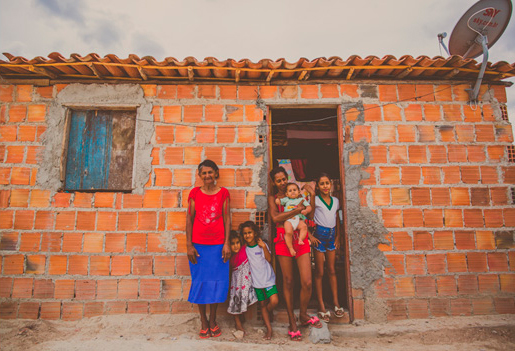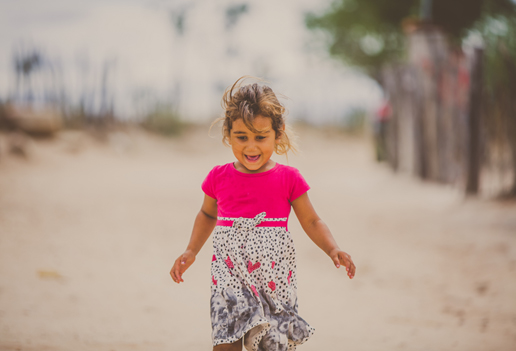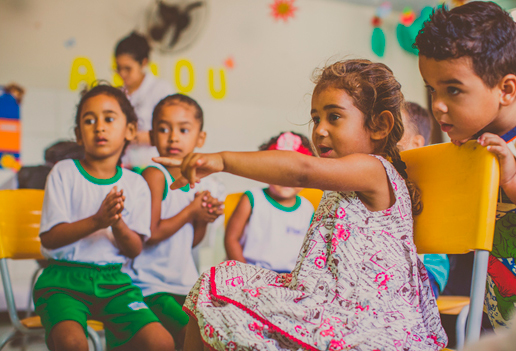
Being at School
In the Bahia hinterland, UNICEF and its partners found Yasmin and her sisters and took the girls to school. Now they have a chance to break the cycle of illiteracy and have a different future than their mother and grandmother.

Sitting next to her daughter and four granddaughters, Silvania Maria de Jesus, 59, is moved to tell the saga of these women, forgotten in the middle of the Bahia hinterland, in the rural area of Euclides da Cunha (BA). Hunger and drought are part of the routine. That day, the gas had run out, and with it the money for the new plug. That's where Mrs. Silvania went to cut wood. The makeshift stove started working again, the family's lunch couldn't wait.
Mrs. Silvania is tired. She has been surviving poverty for many years. “I raised all my children here. My body is like that, skinny, because I never stopped fighting. I'm illiterate and today I'm struggling to learn my name right. I only know how to write halfway through, but I'm struggling to learn.”
The weather is milder that afternoon, it seems that the rain will finally fall in the hinterland. The women are seated in the living room of the small house of Simone dos Santos, daughter of Mrs. Silvania. The exposed brick walls were erected by a cousin. “He saw my daughter's misery and made the house for her,” the mother explains. Some pieces of the house are still missing, which were left to be built when the little money ran out. The back walls and a piece of the ceiling are not there yet. In their place, some makeshift curtains. When the rain comes, it will fall inside the girls' room and wet the few toys that are there.
Speaking softly, with her daughters in her arms, Simone smiles and explains: “we are going through life”. The trajectory of the young woman blends with that of the mother. Now 24 years old, mother of four girls, Simone also can't read and write. “I'm illiterate, I don't deny it. I really wanted to study to have something in my life, to have a future. I went to school a few times, but I stopped when I had my daughters. I had the first one at the age of 14, and that's when I stopped studying”.
In that corner of the hinterland, the trajectories of these women are repeated, in a cycle of illiteracy, early pregnancy, and misery. Silvania is in her daily struggle to take care of her family, Simone has no more dreams for herself.
But the two women look at each other and smile when they talk about the new generation. Dona Silvania's granddaughters, Simone's daughters, are now in school. And the cycle of poverty can be broken.

When a child is found and returns to school, a whole family goes with her
In January 2018, the family was visited by Busca Ativa Escola. It is an initiative of UNICEF and partners to find and bring children and adolescents who were out of school to school. Through a free platform and social technology, UNICEF supports municipalities to organize teams with representatives from the areas - Health, Education, Social Assistance, among others - to find these boys and girls, understand the causes of school exclusion, and guarantee not only their enrollment in school, but also their permanence in the classroom, learning, and academic success.
Euclides da Cunha, the municipality where Mrs. Silvania's family lives, supported the UNICEF proposal and went out to the field to find each of the excluded children and adolescents. In this search, Lucijane Neves, operational coordinator of the initiative in the municipality, and Marly Matos, vice-director of the regional school (EM Luís Valeriano Dias), learned that there were children out of school and with low school attendance there in the hinterland, and they went there.
“I was very happy when they arrived here at home and said that there was a place for Yasmin at school. At first, I was afraid of her going. Then they explained that the school was good, that it would provide a good education, and I put her in. I thought she would enjoy and really learn in life,” Simone says.
Yasmin is 4 years old, the age from which education is compulsory in Brazil. The mother didn't have much information and wasn't going to enroll her for now. She wanted the girl to grow up a little more. The two older sisters, Nicole (5 years old) and Mikaele (10 years old) were enrolled but missed school a lot and were at risk of evading.
The Active School Search team enrolled Yasmin on time and advised the family about the importance of attending school for the three girls. “We knew that, for those girls, being in school was a chance to write a different future,” Marly says. “And we couldn't lose them. From that day on, we started to closely monitor the three of them so that they don't leave school”. Close support from Active School Search is paying off. “Now my three girls are already in school. All that's left is this little one here, Luciene, 7 months old. Now I understand that when she's 4 years old, I have to enroll her too,” Simone says.
Seeing her daughter speak with conviction about the education of her granddaughters, Mrs. Silvania is moved again. The girls' access to school is proof that she did not live in vain. “We don't study. It's the cause of our weakness. My pleasure is to see these little granddaughters at school, graduated, to survive tomorrow and then to survive, to have their daily bread and to be able to provide a better life for their mother. I know that one day I will hear them say 'I'm going to give this joy to my grandmother, who fought so well for me'.

About the UNICEF seal
The municipality of Euclides da Cunha (BA) is participating in the 2017-2020 edition of the UNICEF Seal. By registering for the Seal, municipalities undertake to implement public policies to reduce inequalities and guarantee the rights of children and adolescents provided for in the Convention on the Rights of the Child and the Child and Adolescent Statute.
Among the expected results is the implementation of Active School Search, aimed at the inclusion and monitoring of children and adolescents at school.
To learn more, visit http://selounicef.org.br/
About Active School Search
The Active School Search is a free platform to help municipalities combat school exclusion, developed by UNICEF in partnership with the National Union of Municipal Education Officers (Undime), the National Collegiate of Municipal Social Assistance Managers (Congemas), and the TIM Institute.
The intention is to support governments in the identification, registration, control, and monitoring of children and adolescents who are out of school or at risk of dropping out. Through Active School Search, municipalities and states will have concrete data that will make it possible to plan, develop, and implement public policies that contribute to school inclusion.
The Active School Search brings together representatives from different areas - Education, Health, Social Assistance, Planning - within the same platform. Each person or group has a specific role, which ranges from identifying a child or adolescent out of school to making the necessary arrangements for the enrollment and retention of the student in school. The entire process is done online and the tool can be accessed on any device such as desktop computers, laptops, tablets, cell phones (SMS) or cell phones (smartphones). There are also printed forms for community agents and verification technicians who do not have access
